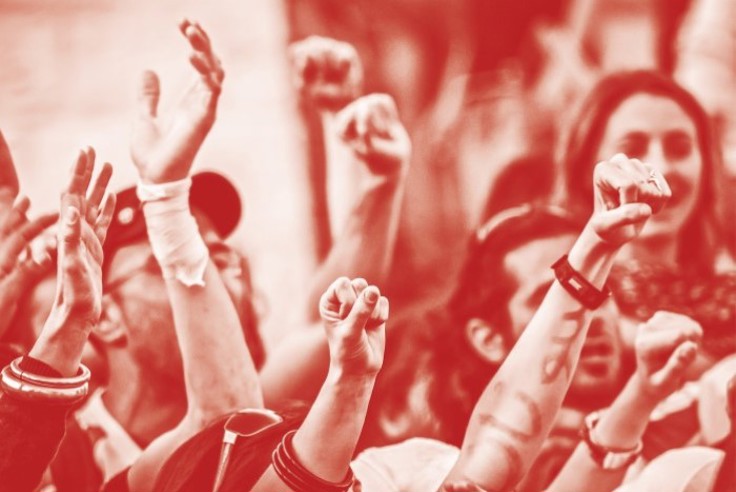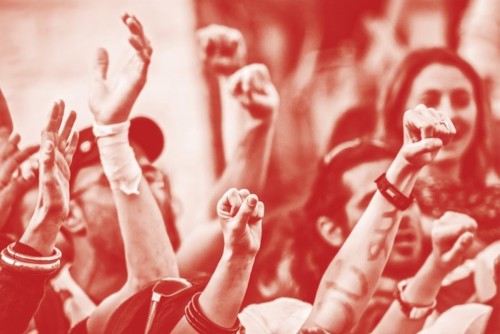Action and Commitments from the CO-CREATE Dialogue Forums
Article
|Published
EAT has developed a Dialogue Forum model to facilitate youth-led policy dialogues with policymakers, business leaders and other stakeholders to empower young people to identify and formulate obesity preventative policies with private and public actors.
The CO-CREATE Dialogue Forums
Through the CO-CREATE project, young people in Europe and South Africa are educatedand empowered to identify and formulate obesity preventative policies, assess these policies with private and public actors and promote tools and strategies for implementation. This is done in part through dialogue with relevant stakeholders such as policymakers and business leaders, known as the Dialogue Forum. EAT has developed a Dialogue Forum model to facilitate youth-led policy dialogues with policymakers, business leaders and other stakeholders, and to collectively identify action and commitments. In total, 20 Dialogue Forums have been held across 52 countries. There have been four regional Dialogues Forums as affiliated side sessions at the Nutrition for Growth (N4G) Summit, the United Nations Food Systems Summit (UNFSS) Pre-Summit, as a joint Food Systems Summit Dialogue (FSSD), and at the International Session of the European Youth Parliament (EYP). Each CO-CREATE country held local level and/or national level Dialogue Forums:
- Poland held 4 local Dialogue Forums.
- Portugal held 3 local Dialogue Forums and 1 national Dialogue Forum.
- The United Kingdom held 3 local Dialogue Forums.
- The Netherlands held 2 local Dialogue Forums.
- Norway held 1 local Dialogue Forum and 1 national Dialogue Forum.
An important part of the Dialogue Forums is its action-oriented nature. Participants in a Dialogue are guided from an idea to action that they can do to take the policy idea further. Throughout the 20 Dialogue Forums, there has been a great variety of stakeholder groups who have offered to act on the youth-led policy ideas. It has been beneficial to invite different groups of stakeholders due to their different expertise, networks and resources to support the young people and their policy ideas. This has also brought about different perspectives to refine and improve the policy ideas from several angles. For the purpose of giving an overview of the diversity of stakeholders, this section will break down the stakeholders into 6 categories:
By clicking on the links, you can download social media-friendly images giving information about each stakeholder's role in the dialogue forums.
Stakeholder commitments
Throughout the 20 Dialogue Forums, stakeholders have committed to several action points. These commitments are divided into three categories:
Knowledge sharing & advisory is defined as commitments that are content-related support, technical support, advisory, revision, and availability.
Connections & networking includes reaching out to relevant stakeholders that can help support the idea or who can provide content-related support, indication of potential sources of financial support, and share internal contacts, and support the outreach.
Action & engagement captures commitments that the stakeholders can do to work towards implementation of the policy idea. This includes initiating projects in their communities or at their workplace that support the policy idea, advocacy of the work done by the young people through different platforms and initiating working groups or alliances that can help take the idea a step further towards implementation.
From Dialogue to Impact
A key aspect of the Dialogue Forums is what happens after. In some cases, stakeholders reached out to the young people to follow-up on the Dialogues and the commitments made. As an example, one stakeholder in Portugal invited a Youth Alliance in Portugal to present their policy ideas at the City Hall. This contributed towards building momentum around the ideas and informed other policymakers about the work done by young people in their community.
In other cases, the stakeholder acted on the commitments made during a Dialogue at their own initiative. For example, a Norwegian politician sent a written question to the Norwegian Minister of Health asking whether they would consider drafting a bill to ban the advertising of unhealthy food and drinks on digital platforms aimed at children under the age of 18 years. The response to the question was based on initiatives that are already in place aimed at the population. It was also argued that digital marketing would require international cooperation due to the nature of social media being borderless.
The full list of actions and commitments from the Dialogue Forums are available for everyone. The action and commitments are direct quotes from the stakeholders and have not been edited by EAT.
What’s Next?
Generational change begins with bringing young people to the table. If we are to have a fair, inclusive and sustainable global community, everyone’s perspectives must be included in decision-making. To support this, CO-CREATE has published the Dialogue Forum tool, which allows youth, policymakers and business leaders from all over the world to meet and discuss important issues and together co-create solutions for the future. The tool is available here, and we invite you to download it and host your own Dialogue today.


